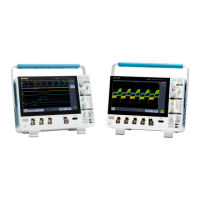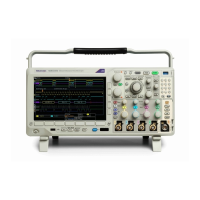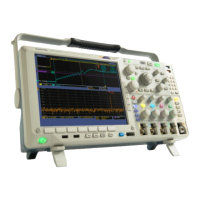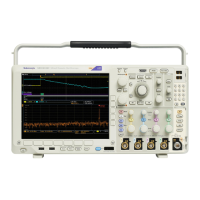Commands Listed in Alphabetical Order
Arguments
TERMinal speci
fies that a session startup message be sent to the socket, and a
command prompt is provided.
NONe disables
these features, allowing the server to be used for raw socket
transactions.
Examples
SOCKETServer:PROTOCol TERMinal sets the protocol to terminal, so that a
session startup message is sent to the socket, and a command prompt is provided.
SOCKETServer:PROTOCol? might return NONE, indicating that the protocol is
set to support raw socket connections.
*SRE
The *SRE (Service Request Enable) command specifies the bits in the Service
Request Enable Register. (See page 3-1, Registers.)
Group
Status and Error
Syntax
*SRE <N R1>
*SRE?
Related Commands
*CLS, DESE, *ESE, *ESR?, EVENT?, EVMsg?, FACtory, *STB?
Arguments
<NR1> is an integer whose values can be 0, 16, 32, or 48. These correspond to the
following *SRE bits:
0 – service request is disabled
16 – request service when the MAV (message available) bit (bit 4) of the SBR
(status byte register) is true
32 – request service when the ESB (event status) bit (bit 5) of the SBR (status
byte register) is true
48 – request service when either the MAV or ESB bits of the SBR (status
byte register) is true
Other argument values may provide unexpected results.
NOTE. The power-on default for SRER is 0 if *PSC is 1. If *PSC is 0, the SRER
maintains the previous power cycle value through the current power cycle.
2-766 MDO4000/B/C, MSO/DPO4000B and MDO3000 Series Oscilloscopes Programmer Manual
